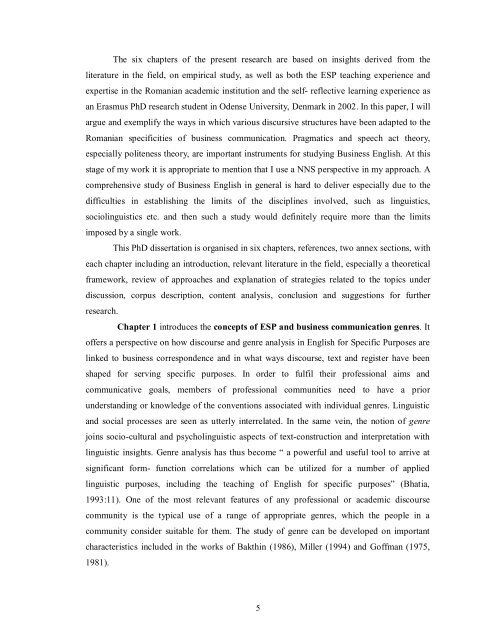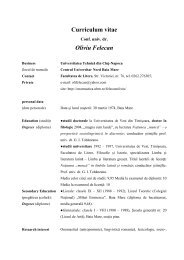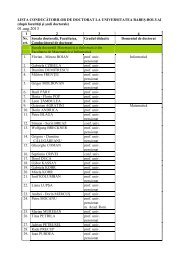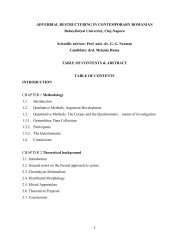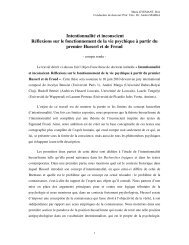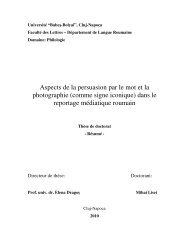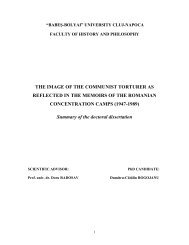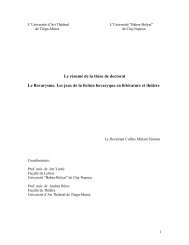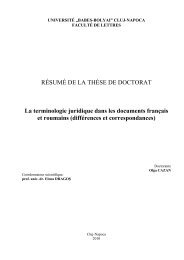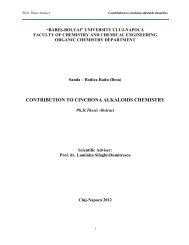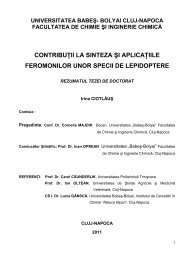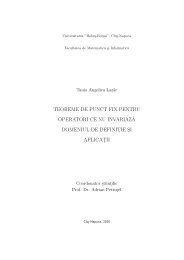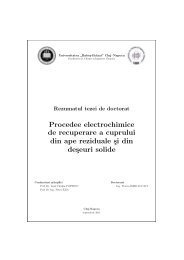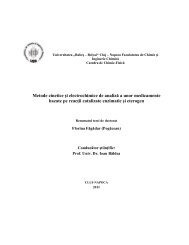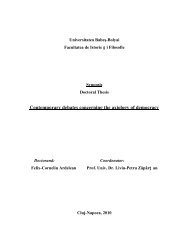1 UNIVERSITATEA “BABES –BOLYAI” CLUJ-NAPOCA ...
1 UNIVERSITATEA “BABES –BOLYAI” CLUJ-NAPOCA ...
1 UNIVERSITATEA “BABES –BOLYAI” CLUJ-NAPOCA ...
You also want an ePaper? Increase the reach of your titles
YUMPU automatically turns print PDFs into web optimized ePapers that Google loves.
The six chapters of the present research are based on insights derived from the<br />
literature in the field, on empirical study, as well as both the ESP teaching experience and<br />
expertise in the Romanian academic institution and the self- reflective learning experience as<br />
an Erasmus PhD research student in Odense University, Denmark in 2002. In this paper, I will<br />
argue and exemplify the ways in which various discursive structures have been adapted to the<br />
Romanian specificities of business communication. Pragmatics and speech act theory,<br />
especially politeness theory, are important instruments for studying Business English. At this<br />
stage of my work it is appropriate to mention that I use a NNS perspective in my approach. A<br />
comprehensive study of Business English in general is hard to deliver especially due to the<br />
difficulties in establishing the limits of the disciplines involved, such as linguistics,<br />
sociolinguistics etc. and then such a study would definitely require more than the limits<br />
imposed by a single work.<br />
This PhD dissertation is organised in six chapters, references, two annex sections, with<br />
each chapter including an introduction, relevant literature in the field, especially a theoretical<br />
framework, review of approaches and explanation of strategies related to the topics under<br />
discussion, corpus description, content analysis, conclusion and suggestions for further<br />
research.<br />
Chapter 1 introduces the concepts of ESP and business communication genres. It<br />
offers a perspective on how discourse and genre analysis in English for Specific Purposes are<br />
linked to business correspondence and in what ways discourse, text and register have been<br />
shaped for serving specific purposes. In order to fulfil their professional aims and<br />
communicative goals, members of professional communities need to have a prior<br />
understanding or knowledge of the conventions associated with individual genres. Linguistic<br />
and social processes are seen as utterly interrelated. In the same vein, the notion of genre<br />
joins socio-cultural and psycholinguistic aspects of text-construction and interpretation with<br />
linguistic insights. Genre analysis has thus become a powerful and useful tool to arrive at<br />
significant form- function correlations which can be utilized for a number of applied<br />
linguistic purposes, including the teaching of English for specific purposes (Bhatia,<br />
1993:11). One of the most relevant features of any professional or academic discourse<br />
community is the typical use of a range of appropriate genres, which the people in a<br />
community consider suitable for them. The study of genre can be developed on important<br />
characteristics included in the works of Bakthin (1986), Miller (1994) and Goffman (1975,<br />
1981).<br />
5


